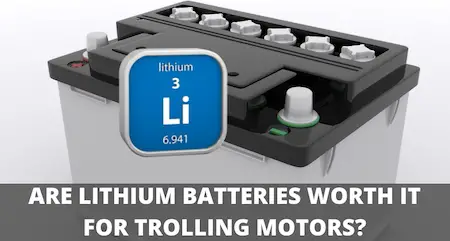Is It Worth Getting Lithium Ion Batteries For Your Trolling Motor? (3 Things You Need To Know)
UPDATED 17 MAY 2023
Are you wondering if lithium trolling motor batteries are as good as people say they are, and if their advantages justify their extra cost?
In this article we’ll walk you through the key benefits of lithium trolling motor batteries.
We’ll also iscuss how they compare to regular lead acid boat batteries, to help you decide which battery type is best for your purposes.

Can you use a lithium battery for a trolling motor?
Yes, you can use a lithium battery for a trolling motor, but you need to make sure that the output voltage of the lithium battery does not exceed the voltage required by your trolling motor.
While many lithium batteries are labelled as ‘12 volt’ or ‘24 volt,’ they often tend to put out a current that’s 2 to 3 volts higher than their rating, and if your trolling motor is subjected to this elevated voltage over extended periods of time, that can cause damage and ultimately malfunction.
So if possible, try to get a specific output voltage number from the lithium battery manufacturer.
If you can’t get that information, then you should assume that your lithium battery is putting out a slightly higher voltage than what it says on the side (such as 14 volts instead of 12 volts).
You can still use it for your trolling motor in that case, but should make sure to choose a speed setting that’s about 20% lower than what you would use with a regular lead acid battery.
So for example, if you have 5 speed settings on your trolling motor, never use setting 5 (or the highest speed) with a lithium battery, but only go up to setting 4.
That way, you’ll only ever go up to 80% of the maximum speed, and this will protect your trolling motor from being damaged by the higher voltage of a lithium battery.
Finally, an even better option is to buy lithium batteries that are specifically designed for trolling motors, and thus extensively tested with them.
If you get one of these from a reputable brand (such as Dakota Lithium), you can be sure that the output voltage of the battery is within the right range for your trolling motor.
In fact, the manufacturer will usually tell you which brands of trolling motors they are compatible with.
If you’re interested in getting a lithium battery for your trolling motor, check out our article on what are the cheapest lithium deep cycle batteries for boats?
Are lithium trolling motor batteries worth it?
Yes, lithium trolling motor batteries are definitely worth getting if you regularly spend a lot of time on the water, or if your boat has very limited storage capacity. This is due to the two key advantages of lithium batteries: their extended run time, and their lightness of weight.
If you like to fish all day long, it’s a common problem for your trolling motor to run out of juice well before you plan to go home (especially on long summer days). In cases like that, using a lithium battery instead of a lead acid battery can keep your motor running all day long without any issues.
Also, if you have a very small boat (such as a tiny bass boat, canoe, or kayak), then reduced stowage space is probably a challenge for you. The lighter weight of a lithium ion battery can go a long way to make the most of your storage space, and if you opt for a single 24 volt lithium battery instead of two 12 volt batteries, this can more than halve the total battery weight on your vessel.
With that being said, if you have a regular size boat, and if you rarely spend more than a few hours at a time on the water, then you’ll probably be fine with a standard lead acid battery, and don’t need to spend the extra money for a lithium marine battery.
Advantages and disadvantages of lithium boat batteries
The key advantages of lithium batteries are as follows:
- Longer run time
- Less weight
- Longer battery lifespan
- Shorter charging time
The first two of these benefits are the most important ones, and are the reason why many professional anglers have switched from using lead acid batteries to lithium boat batteries. When you’re fishing at a whole day tournament, it’s critical not to run out of battery power prematurely.
The shorter charging time is also worth mentioning. While a lead acid battery often requires 8 to 10 hours for complete charging, this time is reduced to 2 to 6 hours for a lithium battery. That means you don’t need to leave it on a charger overnight, but can get it ready for use again in very little time.
The main disadvantage of lithium boat batteries is their relatively steep price: they cost about 3 times as much as standard lead acid boat batteries. However, when you factor in their long lifespan, you actually end up saving money on lithium batteries in the long run.
If you’re thinking about getting a lithium trolling motor battery, you might also be interested in our article: can you connect your fish finder to a trolling motor battery?
How long do lithium trolling motor batteries last?
Run time testing has shown that lithium batteries tend to last 30% to 100% longer than lead acid batteries with comparable amp hour rating. For example, tests by Flux Power showed that their lithium battery has a run time that is 45% longer than a similarly rated lead acid battery.
The reason why lithium batteries last longer with the same amount of charge is because their voltage output remains constant until they are completely discharged, while the output voltage of lead acid batteries rapidly declines during discharge, and falls below the required threshold long before they are empty.
In other words, a lithium battery can keep on running your trolling motor until it is 100% depleted, while a lead acid battery stops being able to do so before it reaches even 70% depletion.
It’s also worth noting that because of this, the amount of runtime that you get for your trolling motor per pound of battery weight is much higher for lithium marine batteries, compared to that of lead acid marine batteries.
Finally, lithium batteries also have a longer battery lifespan, as they degrade less during the charge/discharge cycles. This usually translates into a 2 to 3 years longer lifespan, which is important to keep in mind when deciding whether their higher price is justified.
How to choose a lithium battery for a trolling motor
If you’re ready to get a lithium boat battery for your trolling motor, it’s best to choose one that is specifically designed for use with trolling motors, to make sure you’re getting a compatible voltage. Also, choose a lithium battery with sufficient capacity to keep your trolling motor running the whole day.
For a 12 volt trolling motor, the amp hour capacity of the battery should be equal to or greater than the pounds of thrust of the trolling motor, as shown below:
- 20 to 55 lb motor thrust: 50Ah battery capacity (or greater)
- 70 to 112 lb motor thrust: 100Ah battery capacity (or greater)
When in doubt, get a battery with at least 100Ah, since that is usually enough to last a whole day with a 12 volt motor, unless you’re mostly planning to spend only a few hours on the water at any one time.
For 24 or 36 volt trolling motors, it’s best to get a single 24 or 36 volt lithium battery, since that reduces total battery weight, and also costs less than getting several 12 volt batteries to set them up in a series.
The main exception to this is if you have a dual voltage trolling motor, such as the Garmin Force or Lowrance Ghost, which can operate with either 24 or 36 volts.
The nice thing about these trolling motors is that you can change their thrust by changing the voltage of the battery system, in which case it’s great to have three 12 volt batteries that you can set up as either a 24 or 36 volt system.
Final remarks
It’s super annoying if your trolling motor dies on you right when you get a hot bite, especially if you’ve spent hours trying to find that location.
That’s why it’s essential to get the right battery to power your trolling motor reliably all day long, and lithium ion batteries are currently the best option for this on the market.
